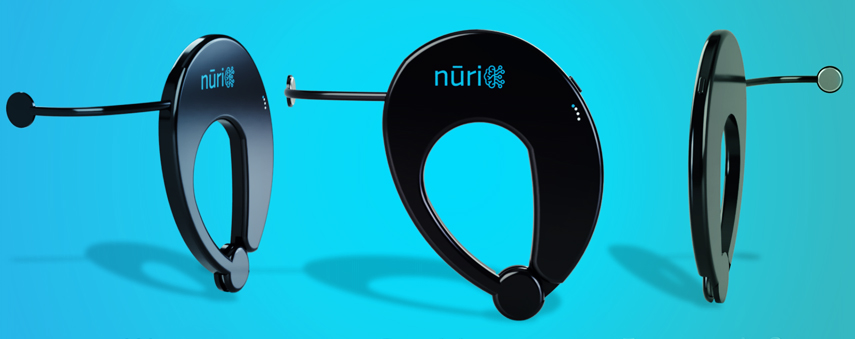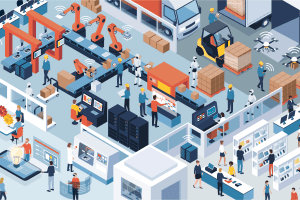Check out Nurio: the product that controls IoT devices with thought control

Credit: Nurio
Imagine being able to turn on the TV just by thinking about it. That’s the premise of Nurio, an earpiece that turns brainwaves into commands for your IoT devices.
If Alexa has made your life easy, Nurio could blow that out of the water. Nurio is a tiny electroencephalogram (EEG), a tracker that can record brain waves. It’s no bigger than an earpiece, all you need to do is think about a command to make it work. Nurio connects to the Bluetooth on your phone and allows you to track progress rather like a Fitbit. It enables you to control devices with just your thoughts, but can it read your mind? Not according to founder Ian Rowan.
“While this seems to be mind reading, the AI which analyzes the [brain] waves more so is finding a pattern in mental activity associated with a particular category and mapping future waves in the same direction,” says Ian. “The Nurio AI engine is not able to ‘decode’ a brain wave into a native language, but rather learns to generalise over patterns in mental activity. This provides pristine data privacy for the users as well.”

The power of neuro-controlled devices could be game-changing. You could notice for example that it’s dark in your room and that you could do with a little more light to read. An EEG device could, in turn, notify your smart lights.
The power of the brain can achieve incredible things, even if its capability isn’t currently being unlocked. “Altogether I think this leverage of the power in all of us can expand human potential,” says Ian Rowan.
How does Nurio control IoT devices?
“The Nurio device fits around the ear like an average headphone and measures brain waves from the frontal region of the brain with high precision,” explains Ian.
Ian founded Nurio on the spark of an idea: fitting considering the product is built to respond to similar sparks of imagination. With the idea of creating an Amazon Echo equivalent that measures brain waves rather than sound waves, he built an EEG and a complex mobile app to go with it.
“This data is continuously streamed to the Nurio app via Bluetooth where it is instantly processed in real-time to provide users with meaningful mental activity metrics,” he says. “This provides users with the first accessible look into their attention, calmness, different wave types and the ability to save and graph mental recording sessions. Outside of just health benefits the Nurio app allows for “thoughts” to stream to the cloud where powerful AI algorithms classify the waves to one of the user’s intents they have configured.”
So rather like reading out instructions for your home assistant, Nurio can translate the pattern of your thoughts to carry out commands. “IoT developers can easily make their devices brain wave-controllable for their users with the Nurio developer platform and command architecture,” Ian confirms.
How will Nurio be used?
Many of us will need a major operation at some point in our lives. Imagine the doctor who carries out your surgery doing it remotely with the power of thought control.
This is an outlandish scenario but Nurio could well be used in the workplace as well as at home. “Businesses can implement Nurio to increase productivity in any action which controls connected devices,” says Ian. “This can include everything from controlling machinery to more simply multi-tasking on our computers.”
One of the biggest advantages of Nurio is the universality of brain waves. Not everyone can articulate in English, especially in noisier environments. The power of Nurio is that it can bring IoT control to people who perhaps can’t speak, either permanently or temporarily.
Nurio aims to be a leading force in this new frontier by continuing to find new innovative ways to streamline the use of EEG data
Ian Rowan, Nurio founder
Aside from the capabilities that Nurio has for switching on smart home devices, the app can help to track health. In a similar way to how Fitbit enables its user to register physical sensations, Nurio takes in brain activity. Could products such as Nurio be used to measure our mental health and improve our mood?
“I envision Nurio used by consumers to unlock the full potential of our wonderful minds,” says Ian. “Using the in-depth health metrics I believe that consumers can begin to understand how their mind is working in their day to day life and learn to optimise themselves towards a more focused and peaceful life.”
IoT could embrace neuroscience
The likes of Amazon and Google have revolutionised IoT. The real capabilities of voice assistants often aren’t utilised, however.
Take Alexa, for example. Whilst most consumers use the gadget for reminders and to play music, there are all kinds of routines that you can trigger from simple commands. Your Alexa can sense when you leave the house and lock the doors, dim the lights and set your thermostat to eco settings. You can even go as far as integrating Echo Buttons into your home, setting them to unlock the back door and training your dog to press the button when it needs to go outside.
With the extent that “soundwave IoT” has developed in the last few years, does Ian expect “brainwave IoT” to dominate the next few years?
“Yes, neuroscience technology is expected to greatly expand above many other technologies in the next five year per studies by multiple firms,” he confirms. “Along with this, AI and Machine Learning algorithms continue to make much more possible with smaller and simpler data. This will help EEG to become more accessible to the average consumer in form factors that can rely on the software to provide immersive experiences.”
Neuroscience is associated far more with AI than IoT. IoT could benefit from neuroscience in the coming years however, with advancements such as Nurio opening doors. “Nurio aims to be a leading force in this new frontier by continuing to find new innovative ways to streamline the use of EEG data,” says Ian.
Discover more about Nurio at http://www.nurio.info/
